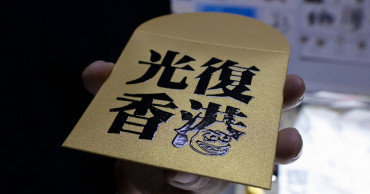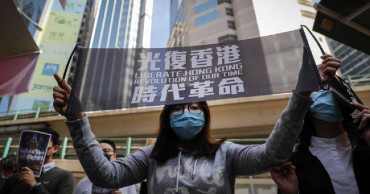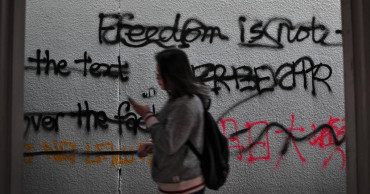anti-government protests
Iranian students hold first large anti-government protests since deadly crackdown
Students from several Iranian universities have staged anti-government demonstrations—the largest since last month’s deadly security crackdown.
The BBC has verified footage showing protesters marching across the campus of Sharif University of Technology in Tehran on Saturday. Clashes were later reported between demonstrators and pro-government supporters.
Other demonstrations included a sit-in at Shahid Beheshti University in the capital and a rally in the northeast city of Mashhad. Students were commemorating those killed in mass protests in January.
Meanwhile, the US has been increasing its military presence near Iran, and President Donald Trump has indicated that a limited military strike is under consideration. The US and European allies have expressed concerns over Iran’s nuclear ambitions, which Tehran continues to deny.
US and Iranian officials met in Switzerland on Tuesday, reporting progress in negotiations aimed at limiting Iran’s nuclear program. Nevertheless, Trump later warned that the world would know within about ten days whether a deal would be reached or if military action would follow. He has previously expressed support for Iranian protesters, even suggesting that “help is on its way.”
Verified footage from Sharif University shows hundreds of students, many waving Iranian flags, marching peacefully while chanting slogans such as “death to the dictator,” directed at Supreme Leader Ayatollah Ali Khamenei. Nearby, supporters of a pro-government rally were also present, and confrontations reportedly broke out between the two groups.
Similar demonstrations were verified at Amir Kabir University of Technology, and in Mashhad, students reportedly shouted “Freedom, freedom” and “Students, shout for your rights.” Additional protests were reported in other locations, with calls for further rallies on Sunday. There are no immediate reports of arrests.
The protests last month, initially sparked by economic grievances, escalated into the largest demonstrations since the 1979 Islamic Revolution. According to the US-based Human Rights Activists News Agency (Hrana), at least 6,159 people were killed during that period, including 5,804 protesters, 92 children, and 214 government-affiliated individuals, with investigations continuing into another 17,000 reported deaths. Iranian authorities have acknowledged more than 3,100 deaths, mostly security personnel or bystanders, blaming “rioters” for the fatalities.
Saturday’s protests come amid heightened tensions, with Iranian authorities preparing for potential conflict with the US. Exiled opposition groups have urged Trump to take action against the Iranian government, while other factions oppose foreign intervention. Both sides have also engaged in social media campaigns, attempting to shape international narratives about the will of the Iranian people.
Source: BBC
6 days ago
Tens of thousands of Israelis join anti-government protests
Tens of thousands of Israelis took to the street in several cities across the country Saturday, protesting judicial overhaul plans by Benjamin Netanyahu’s government.
Critics say measures introduced by the new hard-line government would weaken the Supreme Court, limit judicial oversight and grant more power to politicians. Protesters say that would undermine democracy.
The rift over the power of courts is deepening as the government is set to introduce some of the legislations in parliament Monday amid calls for partial strikes by businesses and professional groups.
For the sixth week, protesters pressed on with large rallies, with the main one in the central city of Tel Aviv and several smaller gatherings in other cities.
3 years ago
Iran official warns protests could destabilize country
Iran’s parliamentary speaker warned Sunday that protests over the death of a young woman in police custody could destabilize the country and urged security forces to deal harshly with those he claimed endanger public order, as countrywide unrest entered its third week.
Posts on social media showed there were scattered anti-government protests in Tehran and running clashes with security forces in other towns Sunday, even as the government has moved to block, partly or entirely, internet connectivity in Iran.
Parliament Speaker Mohammad Bagher Qalibaf told lawmakers that unlike the current protests, which he said aim to topple the government, previous demonstrations by teachers and retirees over pay were aimed at reforms, according to the legislative body's website.
“The important point of the (past) protests was that they were reform-seeking and not aimed at overthrowing" the system, said Qalibaf. “I ask all who have any (reasons to) protest not to allow their protest to turn into destabilizing and toppling" of institutions.
Thousands of Iranians have taken to the streets to protest the death of Mahsa Amini, 22, who had been detained by Iran's morality police in the capital Tehran for allegedly not adhering to Iran's strict Islamic dress code.
The protesters have vented their anger over the treatment of women and wider repression in the Islamic Republic. The nationwide demonstrations rapidly escalated into calls for the overthrow of the clerical establishment that has ruled Iran since its 1979 Islamic revolution.
Iranian state TV has reported that at least 41 protesters and police have been killed since the demonstrations began Sept. 17. An Associated Press count of official statements by authorities tallied at least 14 dead, with more than 1,500 demonstrators arrested.
Qalibaf, the parliamentary speaker, is a former influential commander in the paramilitary Islamic Revolutionary Guard. Along with the president and the head of the judiciary, he is one of three ranking officials who deal with all important issues of the nation.
The three meet regularly and sometimes meet with Supreme Leader Ayatollah Ali Khamenei, who has final say on all state matters.
Qalibaf said he believes many of those taking part in recent protests had no intention of seeking to overthrow the government in the beginning and claimed foreign-based opposition groups were fomenting protests aimed at tearing down the system. Iranian authorities have not presented evidence for their allegations of foreign involvement in the protests.
“Creating chaos in the streets will weaken social integrity, jeopardizing the economy while increasing pressure and sanctions by the enemy,” he said, referring to longstanding crippling U.S. sanctions on Iran.
Qalibaf promised to “amend the structures and methods of the morality police” to prevent a recurrence of what happened to Amini. She died in the custody of the morality police. Her family alleged she was beaten, while officials claim she died of a heart attack.
His remarks came after a closed meeting of Parliament and a brief rally by lawmakers to voice support for Khamenei and the police, chanting “death to hypocrites,” a reference to Iranian opposition groups.
The statement by Qalibaf is seen as an appeal to Iranians to stop their protests while supporting police and the security apparatus.
Meanwhile, the hard-line Kayhan daily said Sunday that knife-carrying protesters attacked the newspaper building Saturday and shattered windows with rocks. It said they left when Guard members were deployed to the site.
On Saturday, protests continued on the Tehran University campus and in nearby neighborhoods and witnesses said they saw many girls waving their head scarves above their heads in a gesture of defiance. Social media carried videos purportedly showing similar protests at the Mashhad and Shiraz universities but The Associated Press could not independently verify their authenticity.
A protester near Tehran University, 19-year-old Fatemeh who only gave her first name for fear of repercussions, said she joined the demonstration “to stop this behavior by police against younger people especially girls.”
Abdolali, a 63-year-old teacher who also declined to give his last name, said he was shot twice in the foot by police. He said: “I am here to accompany and support my daughter. I once participated in the 1979 Islamic Revolution that promised justice and freedom; it is time to materialize them.”
Protests resumed on Sunday in several cities including Mashhad, according to social media reports, and Tehran’s Sharif Industrial University, according to the semiofficial Tasnim news agency. Witnesses said security was tight in the areas nearby Tehran University and its neighborhoods downtown as hundreds of anti-riot police and plain clothes with their cars and motorbikes were stationed on junctions and squares. The AP could not immediately verify the authenticity of the reports.
Also on Sunday, media outlets reported the death of another Revolutionary Guard member in the southeastern city of Zahedan. That brought to five the number of IRG members killed in an attack on a police station by gunmen that, according to state media, left 19 people dead.
It wasn't clear if the attack, which Iranian authorities said was carried out by separatists, was related to the anti-government protests.
Local media said a police officer also had died in the Kurdish city of Marivan, following injuries during clashes with protesters. The protests have drawn supporters from various ethnic groups, including Kurdish opposition movements in the northwest of Iran that operate along the border with neighboring Iraq.
Amini was an Iranian Kurd and the protests first erupted in Kurdish areas.
3 years ago
Anti-government protests in Iran: UK envoy summoned
Iran’s Foreign Ministry said Sunday it summoned Britain's ambassador to protest what it described as a hostile atmosphere created by London-based Farsi language media outlets. The move comes amid violent unrest in Iran triggered by the death of a young woman in police custody.
The state-run IRNA news agency reported the ministry also summoned Norway’s ambassador to Iran and strongly protested recent remarks by the president of the Norwegian parliament, Masud Gharahkhani.
The death of 22-year-old Mahsa Amini in custody after being detained by Iranian morality police launched unrest across Iran’s provinces and the capital of Tehran.
Protests over Amini’s death have spread across at least 46 cities, towns and villages in Iran. State TV has suggested that at least 41 protesters and police have been killed since the protests began Sept. 17. An Associated Press count of official statements by authorities tallied at least 13 dead, with more than 1,200 demonstrators arrested.
Running clashes between demonstrators and security forces have continued to erupt. A member of the Basij, a volunteer force with Iran's Guards, was killed by protesters last night in Tehran, semi-official Fars news agency reported Sunday. Another Basij member, who was in a coma since Thursday after street clashes, died in Urmia, West Azerbaijan province on Sunday, IRNA reported.
The Iranian Foreign Ministry's website said it summoned Simon Shercliff, the U.K.'s ambassador to Iran, on Saturday and protested the hosting of critical Farsi-language media outlets. The ministry alleges the news outlets have provoked disturbances and the spread of riots in Iran at the top of their programs.
Iran said it considers the news agencies' reporting to be interference in Iran's internal affairs and acts against its sovereignty.
The crisis in Iran began as a public outpouring of anger over the the death of Amini, who was arrested by the morality police in Tehran for allegedly wearing her Islamic headscarf too loosely. The police said she died of a heart attack and was not mistreated, but her family has cast doubt on that account.
Amini’s death has sparked sharp condemnation from Western countries and the United Nations, as well as protests in solidarity abroad. On Sunday, violent street demonstrations erupted outside the Iranian embassy in London, with rocks thrown at police and five protesters arrested. A number of police officers were injured in the skirmishes though none seriously.
Pro-government rallies were also held on Sunday in several cities across Iran. Thousands attended a rally in the capital's Enghelab, or Revolution Square, waving Iranian flags. Some officials, including cabinet spokesman, Ali Bahadori Jahromi, attended to the rally in Tehran.
3 years ago
After Kazakhstan unrest, relatives await detainees' release
With about 12,000 people arrested after anti-government protests in Kazakhstan last week, friends and relatives of those held by police waited outside a jail Wednesday, hoping to learn their fate. Some even went to morgues to see if a loved one was among the scores killed in the unprecedented violence in the Central Asian nation.
Authorities have refused to allow relatives or lawyers to see those in custody, giving little information about them, according to human rights activists.
The demonstrations began Jan. 2 in the western part of Kazakhstan over a sharp rise in fuel prices and spread throughout the country, apparently reflecting wider discontent with the government, which declared a state of emergency for the whole country and asked a Russia-led military alliance to send in troops to help restore order.
Read: Kazakhstan says 164 killed in last week's protests
Another 1,678 people were arrested in the past 24 hours in Almaty, the largest city that was hit hardest by the turmoil, and more than 300 criminal investigations have been opened. President Kassym-Jomart Tokayev blamed the unrest on foreign-backed “terrorists,” but did not provide any evidence, and had given shoot-to-kill orders to security forces to quell the unrest.
Outside a branch of the Internal Affairs department that housed a large detention center, a man who gave his name only as Renat said he has been waiting nearly a week to see or get any information about a close friend, Zhandos Nakipovich. He said Nakipovich, whom he described as being like “a brother” to him, was taken into custody on Jan. 4 during a peaceful protest.
“He was at first held at a precinct, then they told us he was in the Internal Affairs department," Renat told The Associated Press. "Since Jan. 6, we’ve been here and we don’t know whether he’s alive or not.”
Military checkpoints prevented anyone from getting close to the building.
“Neither lawyers nor relatives — no one is allowed inside. Lawyers should be present during interrogation, but as you see, no one can pass,” said Galym Ageleuov, head of the Liberty human rights group, who was waiting at the barricade.
“The checkpoint blocks the access for lawyers and relatives to see what’s going on there. We don’t even have the list of detainees,” Ageleuov said.
More than a dozen men and women in dark winter clothes gathered outside one of Almaty's morgues, with some of them waiting to collect the bodies of relatives killed in the unrest. Huddled together in small groups, they stood at the gate of the facility, chatting quietly with each other but refused to talk to a reporter.
Although the official death toll was announced as 164, Tokayev has said hundreds of civilians and security forces were killed and injured.
Read:Kazakhstan adds uncertainty to talks with Russia on Ukraine
Life in Almaty has started returning to normal after days of unrest that saw cars and buses torched, government buildings stormed and set ablaze, the airport seized and the sound of gunfire ringing out. The unrest had largely ended by last weekend.
Public transportation has resumed and shopping malls reopened, and the only reminders of the violence were occasional military roadblocks and the charred exterior of city hall, which was set ablaze at the height of the rioting.
Authorities in the energy-rich country of 19 million sought to mollify the anger at the government by capping fuel prices for 180 days. The Cabinet resigned, and longtime former leader Nursultan Nazarbayev was ousted from his influential post of head of the National Security Council. Nazarbayev had stepped down as president in 2019 after nearly three decades in power, but retained influence in the security forces.
Tokayev requested help from the Collective Security Treaty Organization, or CSTO, a Russia-led military alliance of six ex-Soviet states. The bloc sent over 2,000 troops to Kazakhstan, and Tokayev said the troops will start withdrawing Thursday.
4 years ago
Anti-government protests turn violent in Bangkok
The anti-government protests in Bangkok turned violent on Saturday night with a number of injuries and arrests reported.
5 years ago
Scars of violence haunt India's capital after deadly riot
India's hard-line Hindu nationalists watched anti-government protests centered in Muslim communities for months in anger that finally boiled over in the worst communal rioting in New Delhi in decades, leaving 38 people dead and the Indian capital shell-shocked.
6 years ago
Protest messages shared in Hong Kong Lunar New Year packets
Hong Kong's anti-government protests are putting a new spin on a Lunar New Year tradition.
6 years ago
Hong Kong leader says new year will be a challenging one
Hong Kong Chief Executive Carrie Lam said Tuesday that the city faces multiple challenges in the new year, including "violence, economic tribulation and a health scare" as anti-government protests enter their eighth month.
6 years ago
China replaces its top official in protest-riven Hong Kong
China replaced its top official in Hong Kong on Saturday, state media said, as anti-government protests in the semi-autonomous territory enter their eighth month.
6 years ago

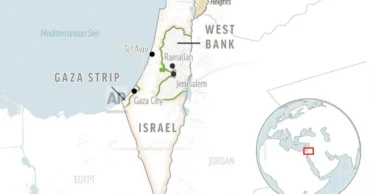

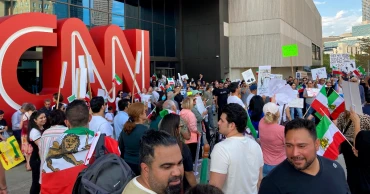


.jpg)
